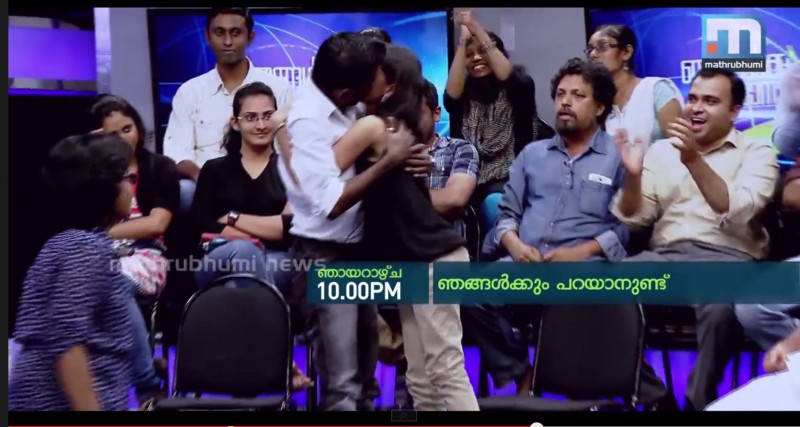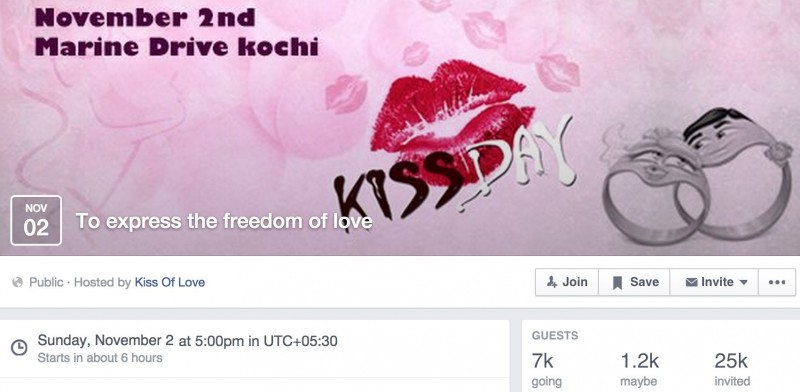 |
| Activists kissed in front of TV camera, and a fracas ensued with conservative participants in a TV talk show of Malayalam language channel Mathrubhumi (click to watch video) |
The "Kiss of Love" campaign, which says it was taking a stand against "moral policing" by right-wing groups, gathered hundreds of protesters on November 2, 2014 Sunday along the shore of the city Kochi, In the Indian state of Kerala, defying a police ban. They faced off with conservative members of student wings of political parties, who prevented them from reaching their intended location. Around 50 of the protesters including the organisers were soon arrested by police, who cited intent to disrupt the peace.
A group of protesters broke away from the police cordon and kissed each other publicly. A large crowd was waiting there to see the protest.
Police dispersed the protesters violently using pepper spray and lathi (baton) charge. The Twittersphere soon erupted (many using the hashtag #KissOfLove):
The 'kiss of love' in #kochi turned violent as cops used lathi charge and made arrests. #kissoflove http://t.co/OyVec2ZGKL
— Shruti (@shrutidshah) November 2, 2014
Kiss of Love Protest from Kerala. Inside the police van as all protestors were arrested by the Police. pic.twitter.com/Yb9SJERbSx
— Inji Pennu (@InjiPennu) November 2, 2014
The crowd of supporters of #Kissoflove who managed to kiss pic.twitter.com/k6iFa7tZ8V
— Dhanya Rajendran (@dhanyarajendran) November 2, 2014
I'm Kerala, people are being arrested for kissing. I'm too stunned to even make a sarcastic comment about it. #KissofLove
— Gaurav Sabnis (@gauravsabnis) November 2, 2014
Public displays of affection have long been seen as vulgar in Indian societies. Even in Bollywood cinema, kissing scenes have been treated as revolutionary, although the trend is changing.But hugging and kissing in public is still not universally accepted in India. On October 23, a Malayalam news channel owned by Indian National Congress political party carried a report with visuals of young couples kissing and embracing in several coffee shops and restaurants in north Kerala’s Kozhikode city, terming them “immoral activities.” This prompted several people, alleged to be members of the Bharatiya Janata Yuva Morcha, a youth-wing affiliated with the ruling Bharatiya Janata Party, to vandalise a coffee shop in Kozhikode. They first criticised the public display of affection by some couples there and then went on a rampage.
In response, a group of young people calling themselves "free thinkers," launched a Facebook page for “Kiss of Love.” It has so far gathered more than 69,000 likes. It describes itself on the page (at the time of writing the report):
Moral policing is a criminal activity. Most political parties and religious organisations try to do that. A group of young bloods join their hands together to prove to the society that kiss is the symbol of love.

More than 7,000 users accepted the Facebook event invitation for the November 2 "Kiss of Love" protest at Marine Drive in Kochi. The organisers stressed that it wasn't "a kiss fest" but a gathering of people of all ages to raise awareness against moral policing.
The event received pushback before it even began. Volunteers were attacked by two men while promoting the "Kiss of Love" protest. Police also denied permission for the event, although two petitions to the high court to stop the event were rejected.
The following Tweet mentions a TV talk show recorded a few days earlier bringing the activists and the conservatives including political party members for a discussion. At one point two activists started kissing in front of camera and a heated fracas ensued between the participants.
What a joke! #KissOfLove organizers faced the ire of Yuva Morcha Jamaath. TV show was disrupted http://t.co/PnLS8TgXpd
— Radha Kapoor Sharma (@radhakaps) November 2, 2014
People supported this campaign on Twitter:
#KissofLove is not about people supporting public kiss,this is clearly a non-violent protest against the stupid moral policing activists!
— ബോബ് മുരളി (@NeutralGuy42) November 2, 2014
Whatever said and done, #KissOfLove is far better than Hartals and other forms of protests; participation and/or support is one's choice.
— dj_Crow (@StupidBeard) November 1, 2014
Doesn't matter if #KissOfLove has large turnout or not, it has already created the buzz and some awareness too, good job organizers :-)
— VenkateshThyagarajan (@myjino) November 2, 2014
All i hope is this #KissOfLove wont end as just a campaign. I hope it go further as a movement. a revolutionary movement.
— Jishnu Vediyoor (@pullipuli) November 2, 2014
However, some did not like the idea of the protest:
Will the organizers of #KissOfLove send their children/siblings for open kiss parade today?
— Abdulla Madumoole (@AMadumoole) November 2, 2014
Say no to #KissOfLove . Yardstick - whatever you are able to do with ease at home in front of parents, elders, children, etc- do in public.
— Manikant Kant (@ManikantKant) November 2, 2014
ABVP Kerala create protective wall against Love Jehadi intrusion in the name of 'Kiss of Love' pic.twitter.com/SZJLLsbbtK
— Jayashankar (@jaypanicker) November 2, 2014
The moral policing issue has become a problem in Kerala, especially for women who are often the targets of such efforts. Shahina KK analysed the psyche of these men who are judging others in Open magazine three years ago. The writer pegged the problem in Kerala as having to do with "a crisis of gender relations all of Kerala’s own," pointing out that men who moral police aren't always from right-wing groups, but can span the political spectrum:Men in Kerala appear over-concerned about what women do, how they turn up in public—with whom, how, and when. To fall in love is almost seen as a crime in the state now. Public spaces are being fumigated, so to speak, to protect society from such dangers as public displays of affection. A couple sitting together in a park or on a beach can expect to be roughed up by strangers, some of them in police uniform. Meanwhile, cases of sexual harassment, molestation and rape have reached levels never seen before.The "Kiss of Love" campaign is reminiscent of the Pink Chaddi Campaign in Mangalore, in the neighbouring state of Karnataka, where on Valentine's Day 2009 hundreds of people sent pink underwear to the office of right-wing group Sree Ram Sena, which had harassed some women at a pub in an attempt to moral police.
It remains to be seen when the Indian culture will start accepting kissing in public.
With additional reporting by Inji Pennu.
The post was also published in Global Voices Online.
























0 comments:
Post a Comment